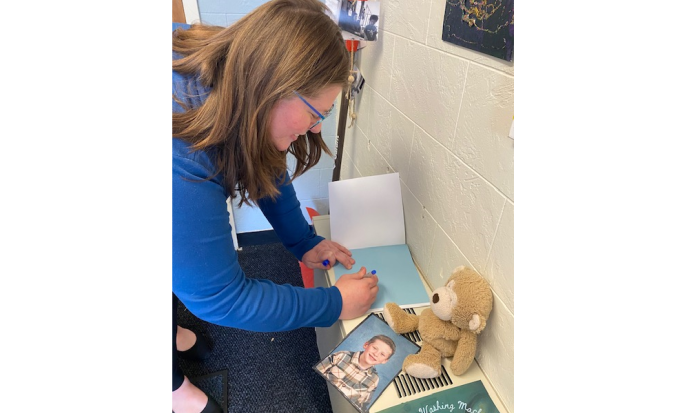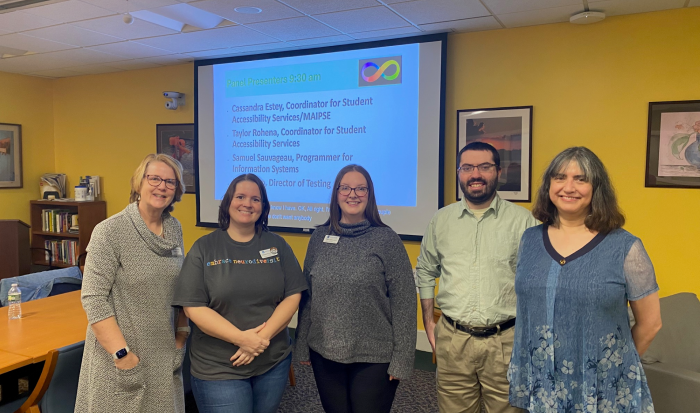

Throughout Autism Acceptance Month, which occurs every April, Student Accessibility Services provided a number of ways for the QCC community to get involved and expand its knowledge about neurodiversity.
A panel discussion offered a chance for staff members experiencing neurodiversity to share personal stories, challenges and strategies for success. The conversation revealed important insights about supporting neurodivergent students while celebrating their unique strengths and perspectives.
A key theme throughout the discussion was the importance of moving away from the traditional "deficit model" that focuses on what neurodivergent individuals struggle with. Instead, panelists advocated for acknowledging and celebrating the unique strengths and perspectives these students bring to the classroom.
Student Accessibility Service Coordinator Taylor Rohena shared experiences with perfectionism that caused significant physical stress, especially during group work.
"In college, I didn't understand why I did that, because I wasn't diagnosed at the time," Rohena explained.
Working in retail forced uncomfortable situations that ultimately helped with personal growth, while supportive faculty who noticed patterns helped her better understand these challenges.
Student Accessibility Service Coordinator Cass Estey described the exhausting process of "masking" – appearing outwardly composed while struggling internally.
"You could look at us on any given day and think we have our stuff together. The next day we're crumbling. It's not always logical," Estey explained.
Despite excelling academically through K-12, Estey's carefully developed coping strategies eventually faltered during graduate studies.
"I was masking and did really well with the strategies I developed. It worked well, until it didn't," Estey reflected.
Junior Systems Analyst/Programmer Samuel Sauvageau, diagnosed after college, expressed regret at not accessing accommodations earlier.
"I didn't capitalize on my diagnosis with accommodations because I didn't know I needed them."
Sauvageau avoided classes requiring spontaneous participation or group work, excelling instead in lecture-based courses with limited social interaction.
Several panelists noted that many neurodivergent students resist seeking help, believing they simply need to "try harder," but there are ways for faculty and staff to support neurodivergent students.
Sauvageau advised taking things "one day at a time, one person at a time," emphasizing that many neurodivergent traits aren't immediately visible.
Rohena suggested greeting returning students with "I'm so happy to see you" rather than questioning absences. This positive approach acknowledges the student without adding shame or stress.
Proctor highlighted that behaviors like doodling or fidgeting during presentations often help neurodivergent students focus, rather than indicating disinterest.
"Invite people but don't force them. Present a world in which they want to be welcomed," Sauvageau suggested.
Director of Testing Laura Tino, speaking from a parent's perspective, advocated for a "graduated approach" between hovering and hands-off support, suggesting quieter events with less sensory stimulation as helpful alternatives.
Director of Student Accessibility Services Kristie Proctor also addressed the complexity of how neurodivergent individuals choose to identify, with some preferring disability-first language and some preferring identity-first language.
As Estey noted, "I want to be celebrated as a student, not a 'neurodiverse' student. It's not all about the struggles."
This community conversation represented an important step toward creating a more inclusive campus environment that values neurodiversity as an asset rather than an obstacle—one where all students can thrive by being authentically themselves.
Another QCC staff member with lived experience is Enrollment Counselor Caitlin Bogue who utilized her creativity to expand awareness and acceptance of neurodiversity. Bogue recently authored a children's book, "Everett's Washing Machine," about Everett, her eight-year-old son, who has autism.
During a reading of the book at the Children's School this month, Bogue explained to the students how watching things spin makes Everett feel calm and happy, which led to a fascination with the washing machine in their home. Students pondered what makes them happy in their own life, learning the things they might have in common with someone who has autism.
The hard work of the Student Accessibility Services team and other supporters is making strides in not just acknowledging neurodiversity but accepting and embracing it in our lives.
